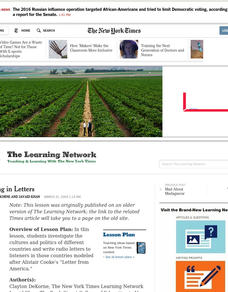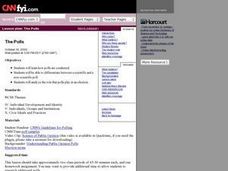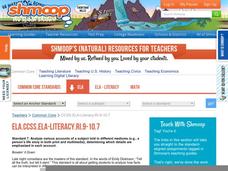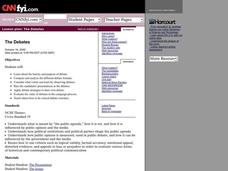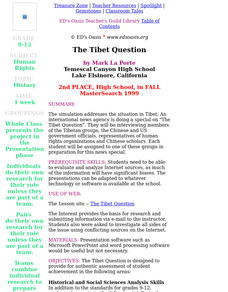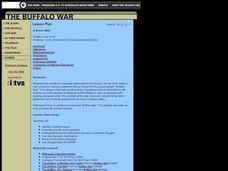Curated OER
Reporting in Letters
Students investigate the cultures and politics of different countries and write radio letters to listeners in those countries modeled after Alistair Cooke's "Letter from America."
Curated OER
Discovering Advanced Algebra More Practice Your Skills, Lessons 11.1-11.6
In this six page series of worksheet, students answer short answer questions about a variety of topics. The six topics covered in this packet are: Experimental Design (4 questions), Probability Distributions (3 multiple choice...
Curated OER
Worksheet for Analysis of a Newspaper Article
In this primary source analysis worksheet, students respond to 20 short answer questions that require them to analyze their selected newspaper articles.
Curated OER
Depicting Women and Class in a Global Society
Students analyze the evolution of women's work from the 19th century to present day and create artwork depicting women. In this women's roles lesson plan, students compare and contrast the use of space and color in the two paintings...
Curated OER
Historical Witness - social Messaging
Students examine and develop artwork that shows women's roles during different eras. In this women's role lesson, students look at artwork that shows women at work during the mid-nineteenth to early twentieth century. They design a mixed...
Curated OER
Empowered Barbie
Learners access prior knowledge of vocabulary on feminism and psychoanalytic theory, and gender schema. In this Empowered Barbie lesson, students recreate a Barbie doll. Learners write a reflection on how they changed Barbie's body and...
Close Up Foundation
Teach the Vote
Why is voting important? A social studies unit presents a non-partisan approach to the importance of voting, to voting laws and procedures, and to resources that voters need to become informed voters.
Curated OER
Name Brands
Students explore the possibility that a products name might bias a consumers decision to buy a particular product. The question remains to be answered, "Why do consumers buy what they buy and why that particular product?"
Curated OER
The Polls
Students obtain how polls are conducted. They differentiate between scientific and non-scientific poll. They analyze the role that polls play in an election.
Curated OER
Japan's Textbook Case
Students read and discuss "Japan's Refusal to Revise Textbooks Angers Neighbors." They discuss how accurately textbooks account for historical events, then collaborate to write unbiased textbook entries for current events.
Shmoop
ELA.CCSS.ELA-Literacy.RI.9-10.7
When your pupils read an account of an event, are they conscious of the fact that this particular account might focus on certain details, while ignoring others? Open their eyes to bias and varying interpretation of facts with the ideas...
Curated OER
From Whose Perspective?
Students critically analyze news coverage of Palestinian-Israeli violence by comparing information from a variety of news sources. They compose expository essays reflecting on how to obtain accurate, unbiased, and credible information.
Curated OER
In Search of Al Qaeda
Students locate the Middle Eastern countries and capitals visited by Frontline reporters. They read online dispatches by the journalists, and complete a student assignment sheet.
Curated OER
Is All Fair In War?
Students read the 1755 Bounty Proclamation and discuss what happened in Maine during this time period. With a partner, they use the text and dictionary to look up any word they do not know. They participate in a think, pair, share to...
Curated OER
The Debates
Students examine the history and purposes of debate, and analyze the different debate formats. They rate the candidates' presentations in the debates, and apply debate strategies to their own debates.
Curated OER
To Kill a Mockingbird
Students explore the components of racismas they read through Horton Foote's, "To Kill a Mockingbird." The trial of the main character reveals instances of justice in the face of prejudice and forms the focus of the instructional activity.
Curated OER
History and Human Rights: A Process for Analyzing Events
Students analyze various American History topics which concern human rights. They research the topics and analyze the sources for bias or stereotype. They decide and discuss whether or not any human right were violated in each...
Curated OER
Understanding Causes of Global Conflict: Peer Interviews
Young scholars examine sources of conflict. In this global conflict lesson, students discuss how peer pressure, bias, oppression, ethnocentrism, miscommunication, and fear contribute to personal conflict as well as global conflict. Young...
Curated OER
The Tibet Question
Students participate in a simulation, where they interview members of the Tibetan groups, the Chinese and US government officials, representatives of human rights organizations and Chinese scholars. Each student will be assigned to one...
Curated OER
Cartoons for the Classroom: Xenophobia
For this historical events worksheet, students analyze an anti-immigration political cartoon and respond to 3 talking point questions.
Curated OER
A Bison Web
High schoolers view a documentary on the treatment of the buffalo. In groups, they create a website using ideas and solutions they developed. They must include graphics or animation and a multi-level webpage. They share their pages...
Curated OER
The Lion and the Mouse
Students write a story. In this critical thinking and writing lesson, students read a fable, answer the provided thinking skills questions, and write their own fable.
Curated OER
Using Primary Sources to Discover Reconstruction
Fifth graders discover how reconstruction had an impact on racial issues in the United States. In this Reconstruction lesson, 5th graders are introduced to primary vs. secondary resources and then rotate through stations to view...


